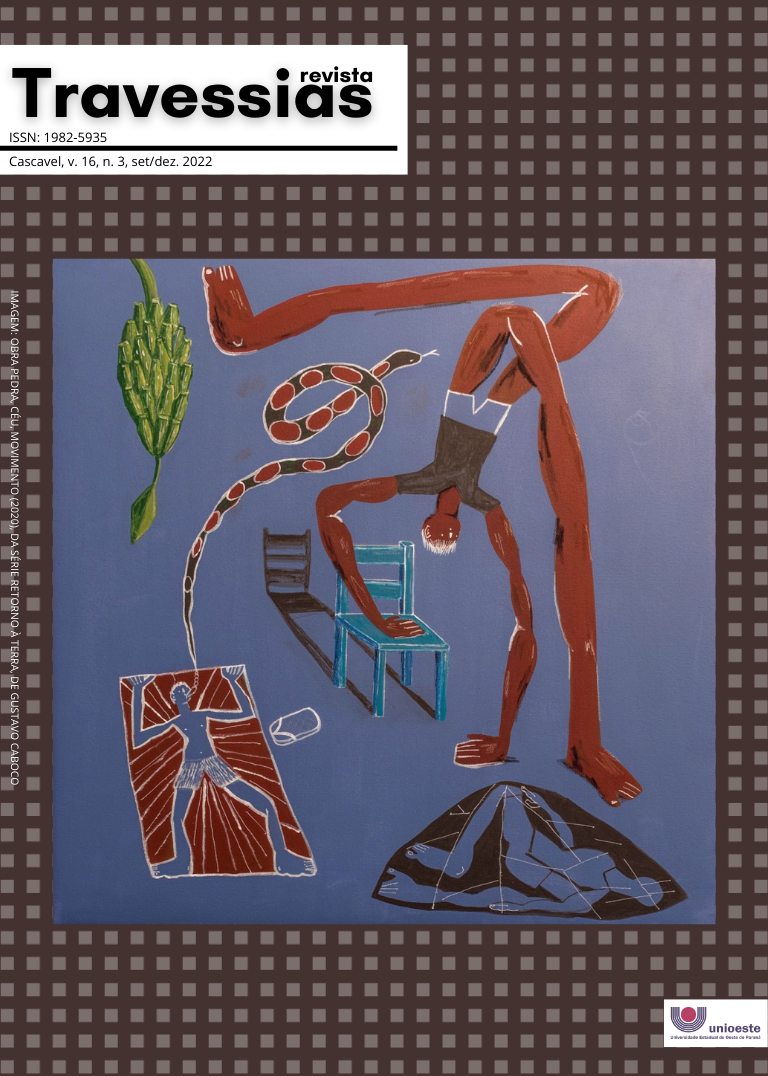Bodies that tell themselves
the homeless woman
DOI:
https://doi.org/10.48075/rt.v16i3.29276Keywords:
Discourse, body, homeless womanAbstract
This article analyzes the speech of two homeless women about the self-perception of their bodies in the midst of their miserable situation. It aims to problematize the meaning effects that are established due to a memory that, ignorant of the subject-position occupied by the two women, makes them announce a speech invested with a vanity that performatizes their belonging to a discursive formation of femininity. The article has as theoretical and methodological reference the Discourse Analysis of French line founded by Michel Pêcheux and developed in Brazil from the studies of Orlandi and other researchers who align themselves with the theory, developed by a qualitative-interpretative research through the interviews of the two homeless women. We aim to show how there is a memory that mobilizes the sayings beyond an economic-social aspect. As well as problematizing whether their looks at their beauties to give new meaning the place of exclusion: the street is a space for the excluded, but it is the home of those who inhabit it, or strengthen stereotypes and social imaginaries repeated and stabilized through the discourses of domination.
Downloads
References
FRANGELLA, S., RUI, T. Corpos Precários: apontamentos para a relação entre corpo e cidade, Política e Trabalho. Revista de Ciências Sociais 47 [Número Temático “O Corpo na Pesquisa Social”], 2017.
FOUCAULT, Michel. Vigiar e punir: nascimento da prisão. Tradução Ligia M. Ponde Vassallo. Petrópolis: Vozes, 1987.
GOMES FILHO, J. ; SOUZA, I. L. Identidade, discurso e poder do morador de rua: a construção de uma utopia através do jornal 'Aurora da Rua'. In: SEMINÁRIO DE PESQUISA EM ESTUDOS DE LINGUAGEM, 8., 2014, Vitória da Conquista. Anais [...].Vitoria da Conquista: UESB, 2014. v. 8. p. 89-96.
LAGAZZI, S. Linha de Passe: a materialidade significante em análise. RUA, [S. l.], n. 16, v. 2, 2010.
LEANDRO FERREIRA, M. C. O corpo como materialidade discursiva. Redisco, Vitória da Conquista, v. 2, n. 1, 2013, p. 77-82. Disponível em: http://periodicos.uesb.br/index.php/redisco/article/viewFile/1996/1723.Acesso em: 27 jul. 2020.
MILANEZ, N. Mídia e História: deslocamentos do corpo, do sexo e da memória. In: SANTOS, J. C.; FERNANDES, C. A. (org.). Análise do Discurso: objetos literários e midiáticos. Goiânia: Trilhas Urbanas, 2006.
ORLANDI, E. P. Análise do Discurso: princípios & procedimentos. São Paulo: Pontes, 2001a.
ORLANDI, E. P. Eu, Tu, Ele – Discurso e real da história. 2. ed. Campinas: Pontes, 2017a.
ORLANDI, E. P. Processos de significação, corpo e sujeito. In: ORLANDI, E. P. Discurso em Análise: Sujeito, Sentido e Ideologia. 3. ed. Campinas: Pontes, 2017b.
ORLANDI, E. P. Linguagem e educação social: a relação sujeito, indivíduo e pessoa. In: RUA, [S. l.], v. 2, n. 21, p. 187-198, nov. 2015.
PÊCHEUX, M. O discurso: Estrutura ou acontecimento. 2. ed. São Paulo: Pontes, 1997.
Downloads
Published
How to Cite
Issue
Section
License
Copyright (c) 2022 Authors keep the copyright and grant the journal the right of first publication, with the work simultaneously licensed under the Creative Commons Attribution License (CC-BY-NC-SA 4.0), which allows sharing the trial with acknowledgment of authorship and initial publication in this journal.

This work is licensed under a Creative Commons Attribution-NonCommercial-ShareAlike 4.0 International License.
Creative Copyright Notice
Policy for Free Access Journals
Authors who publish in this journal agree to the following terms:
1. Authors keep the copyright and grant the journal the right of first publication, with the work simultaneously licensed under the Creative Commons Attribution License, which allows sharing the trial with acknowledgment of authorship and initial publication in this journal.
2. Authors are authorized to take additional contracts separately, for non-exclusive distribution of the work version, published in this journal (eg publish in institutional repository or as a book chapter), with acknowledgment of authorship and initial publication in this journal.
3. Authors are allowed and encouraged to publish and distribute their work online (eg in institutional repositories or on their personal page) at any point before or during the editorial process, as this can generate productive changes, as well as increase both impact and citation of the published trial (See The Effect of Free Access).
Creative Commons License
This work is licensed under a Creative Commons Attribution–NonCommercial-shareaswell 4.0 International License, which allows you to share, copy, distribute, display, reproduce, completely or part of the work, since there is no commercial purpose, and authors and source are cited.



